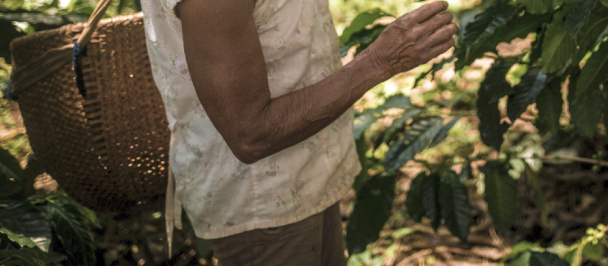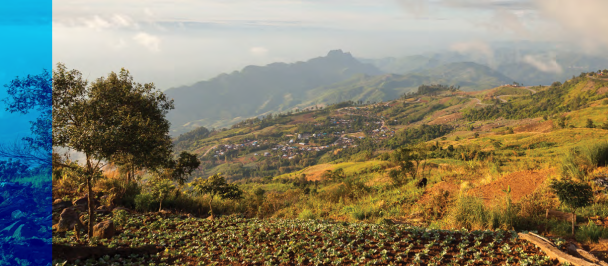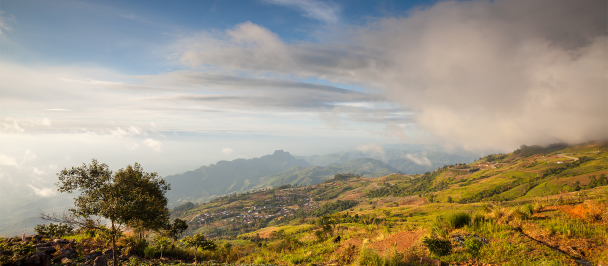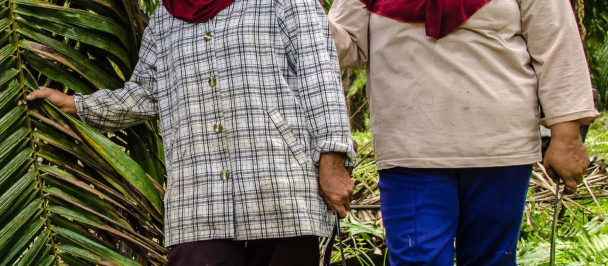Indonesia, the world’s top palm oil producer, has kicked off a UNDP-supported nationwide certification process to help palm oil smallholder farmers – who produce about 40% of the country’s palm oil - increase their productivity in a sustainable, environmentally responsible and legal manner.
The Indonesian Ministry of Agriculture and UNDP this week began the process of pilot testing the guidelines for smallholder certification using the Indonesian Sustainable Palm Oil (ISPO) system with six palm oil cooperatives, representing a total of 2,200 farmers, in Riau province on Sumatra island, a key palm oil producing area in Indonesia.
This is the first time that ISPO – a mandatory, government-led scheme launched in 2011 – has started certification of smallholders. The overarching objective is to improve agricultural practices through greater access to training and extension services, and protect the country’s unique biodiversity. To date ISPO certification has focussed on private companies.
“The government of Indonesia, through ISPO, is now focussing on certifying small-scale palm oil farmers,” said Dr. Rosediana Suharto, ISPO’s Executive Chairman. “It is a big and unprecedented step, and the results of this pilot phase will be key to moving forward and certifying all smallholders in Indonesia. This demonstrates the government commitment to boosting palm oil productivity while respecting our unique biodiversity.”
ISPO – launched in 2011 - is a national certification scheme covering all producers in the country (from large-scale to family-scale) and sets the legal standard for good agricultural practices and environmental management. ISPO – which aligns with guidelines set out by the voluntary standard the Roundtable on Sustainable Palm Oil (RSPO) - is expected to bring much needed transparency and legality into the palm oil supply chain, which in turn should result in improved livelihoods for smallholders.
Often farming in isolated areas and with little regulatory oversight, smallholders (up to 25 hectares is considered a smallholding) frequently lack agricultural know-how so are less productive compared to larger companies, leading to pressure to clear forests, use harmful chemicals and engage in other environmentally unsustainable agricultural practices to grow oil palm. These farmers are also less likely to be integrated into the global supply chain, and so lose out financially and technically.
“ISPO is rather like a driving license for palm oil famers in Indonesia. By requiring all farmers to meet minimum sustainability requirements, the government is actually committing to formalize palm oil smallholders, and provide vital assistance such as land titles and capacity building. This is long overdue and will allow Indonesia not only to improve farming practices and the economic outlook from palm oil, but also protect the country's environment and forests,” said Tomoyuki Uno, Asia Manager for UNDP’s Green Commodities Programme.
The certification process for smallholders is expected to take several months, depending on the results of this initial pilot-testing phase. The lengthy process includes multiple questionnaires for the smallholders, in addition to the review of key information by ISPO auditors regarding pesticide use and storage, seed purchase and land clearing that was required to start the palm oil smallholding.
The ISPO smallholder certification pilot is part of the Sustainable Palm Oil Initiative, officially established by the Indonesian Agriculture Ministry and UNDP in 2014, with the aim of helping low-income oil palm farmers increase their productivity and improve the sector’s environmental management. The Initiative works at the national level and in three pilot provinces (Riau, South Sumatra and West Kalimantan).

 Locations
Locations



